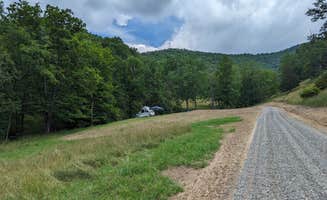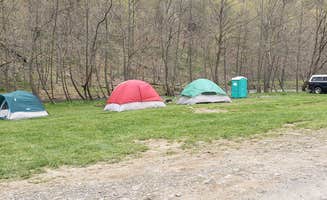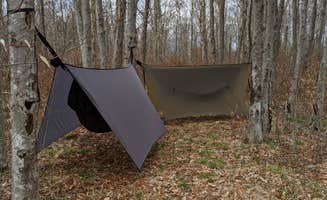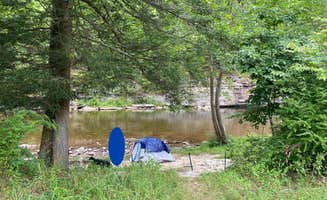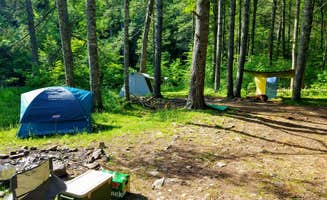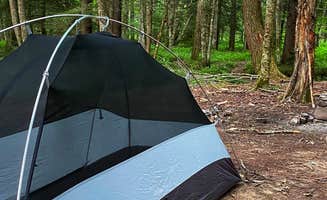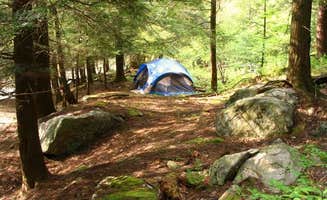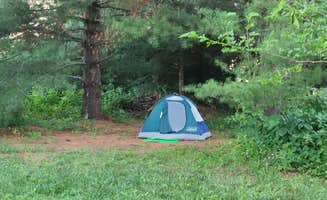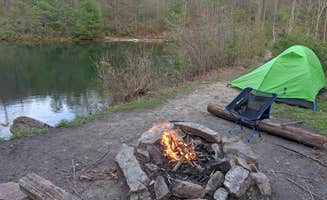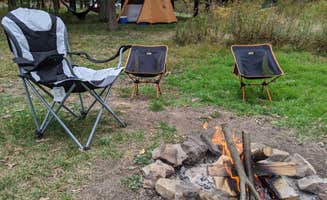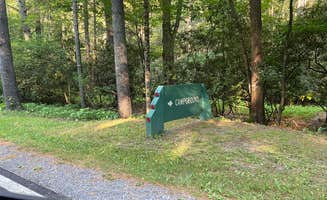Primitive camping options near Seneca Rocks provide access to West Virginia's rugged Monongahela National Forest, with elevations ranging from 1,000 to over 4,800 feet. Most dispersed sites require vehicles with higher clearance, especially during wet weather when forest roads become challenging. Winter temperatures can drop below freezing, making three-season tents and proper insulation essential for off-season camping.
What to do
Fly fishing: Multiple streams near Little River Dispersed Campsites offer excellent fishing opportunities. According to one visitor, "We hiked the Span Oak trail, at the beginning of the camping area, which led us along a beautiful ridge." Another camper noted, "When you park and walk down to the river, if you turn right, there's a beach area about 50 yards down that offers a great spot to take a dip!"
Explore boulders: Rock formations at Bear Heaven Campground provide natural climbing opportunities for all skill levels. A camper shares, "The camp ground isn't that large, but if you can find a spot you will be sure to enjoy yourself. Right beside the camp ground is a really cool area to explore unique boulders and rock structures. You can either walk through or climb these boulders."
Visit fire towers: Several lookout points are accessible within a short drive of campsites. "Just a few miles up the mountain you can go to Bickles Knob firetower and get one of the best views in the state," reports one Bear Heaven visitor, offering a perfect activity for clear days.
What campers like
Creek-side camping: Many campers at Switzer Lake Dispersed Camping appreciate the water access. One camper explains, "There is a huge variety of spots, starting from huge ones right on the lake to more secluded, smaller spots deeper in the woods along the creek." The sound of flowing water creates natural white noise for sleeping.
Solitude: Most primitive sites offer substantial privacy between campers. At Little River, a visitor observed, "Beautiful dispersed camping near a creek in dense, lush forest. Not much for views and only stayed one night so didn't get to hike but it was a perfect, quiet spot for an overnight."
Wildlife viewing: The best tent camping near Seneca Rocks, West Virginia often includes animal encounters. One camper at Little River warned, "Not even 2 minutes from our dispersed camp site we were charged by an extremely aggressive black bear," highlighting the importance of proper food storage. Early mornings offer the best wildlife viewing opportunities.
What you should know
Road conditions: Access to many sites requires careful driving. A Switzer Lake visitor cautioned, "The road is a mix of gravel but also dirt so it can become muddy during rain. If you follow the road, there is a river crossing that will take you to additional camp spots. The road beyond the river can get more tricky for low clearance vehicles."
Bear safety: Food storage is critical at all sites. Another Little River camper advised, "We decided to keep ALL FOOD in the car's trunk those nights and not hanging in a tree just to be safe." Bears are most active at dawn and dusk, so plan meal preparation accordingly.
Cell service: Most primitive camping areas have no connectivity. At Switzer Lake, a camper noted, "Just a heads up, there is no cellphone signal for any carrier from what I could tell." Download offline maps before arrival to navigate forest roads.
Tips for camping with families
Choose sites with amenities: For easier family camping, Eagle Rock Campground provides basic facilities. A visitor explained, "Vault toilet & portapotty are available, but no other amenities except fire rings." These minimal facilities make transitions to primitive camping more manageable for children.
Bring water containers: No drinking water is available at most sites. At Eagle Rock, campers pay "$10 will get ya a nights stay. Like previously said drop your money in a slot and enjoy the river. Nothing special or pretty just a cool little spot to lay your head."
Plan wildlife education: Turn animal safety into learning opportunities. Pack field guides to identify tracks, plants, and birds common to the Monongahela Forest region.
Tips from RVers
Length limitations: Most dispersed sites accommodate smaller rigs only. At Abrams Creek Campground, a visitor noted, "The campground is long and narrow bordering on Abrams Creek. We took daily walks to the end of the campground and enjoyed the scenic views." Check site dimensions before arrival.
Consider cabins for bad weather: Some locations offer simple cabins as alternatives to tent camping. The same Abrams Creek visitor explained, "Tented a cabin for two nights to hide from bad weather. Cabin had electric service, a microwave, electric heater, refrigerator and lights." These options provide backup if weather turns poor during your stay.
Self-contained systems: Most primitive sites near Seneca Rocks have no hookups or dump stations. Bring sufficient water and plan for waste management accordingly.


